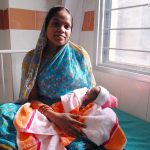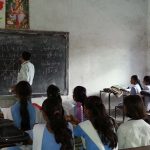The Keough School of Global Affairs’ Kroc Institute for International Peace Studies and Pulte Institute for Global Development have launched the Afghan Peace and Development Research Program (APDRP), to amplify the voices of Afghan peace and development scholars and practitioners.
The new program builds on the Keough School’s previous work to study and promote peace and human rights in Afghanistan, while creating new research opportunities.
Lisa Schirch, Richard G. Starmann, Sr. Professor of the Practice at the Kroc Institute, said the initiative will help preserve the existing “brain trust” of peacebuilders and mediators in Afghanistan.
“Afghanistan has an unusual amount of capacity for peacebuilding due, in part, to large investments in peacebuilding efforts over many decades,” Schirch said.
Ray Offenheiser, William J. Pulte Director of the Pulte Institute, said the partnership would help support important humanitarian work in Afghanistan.
“Both peacebuilding and development practitioners working in Afghanistan want to know the long term development trajectory for the country,” Offenheiser said. “How do we move from a situation where things are falling apart to having a country that’s a decent place for people to live and prosper. The humanitarian work is an area where Kroc and Pulte’s work is linked.”
Project draws on faculty and alumni expertise
The program is led by a group of Keough School faculty whose expertise includes peacebuilding, development, mediation, peace agreement negotiation and implementation, and more.
In addition to Notre Dame faculty, two Kroc Institute alumni from Afghanistan serve as program advisors: Aref Dostyar (M.A. ’16), former Consul General of Afghanistan in Los Angeles and a current Scholar in Residence at the Kroc Institute, and Malalai Habibi (MGA ’19), program officer with the International Civil Society Action Network. Faculty members are in the process of identifying additional Afghan advisors to support the program.
The APDRP builds on the Keough School’s strong foundation of research and public conversations on Afghanistan, including:
- Professor Emeritus David Cortright’s work in Afghanistan, which had resulted in a book on ending the US war there.
- New initiatives following the Doha Peace Accords by the Kroc Institute’s Peace Accords Matrix program (PAM) and ongoing research by Research Professor Madhav Joshi to support women’s rights in Afghanistan.
- An August flash panel on the unfolding situation in Afghanistan;
- An October seminar at the Keough School’s Washington office that featured Afghan entrepreneurs, diplomats, policymakers and academic leaders offering concrete proposals to DC policymakers.
Since its formation in January 2022, the APDRP has hosted numerous public and private events addressing the crisis in Afghanistan. In February, Laurie Nathan, Mediation Program Director at the Kroc Institute, partnered with the Peace Research Institute of Oslo on a discussion on the expected revision of the United Nations Assistance Mission in Afghanistan; the APDRP also convened an off-the-record dialogue bringing that focused on how to respond to the humanitarian crisis in the country.
Both events demonstrate APDRP’s commitment to convene diverse stakeholders in conversation, Nathan said.
“We want to model inclusivity in both our process and our outcomes,” he said. “Peacemaking will not work if it’s exclusive.”
At the request of Afghan peacemakers, the APDRP will also draw on the expertise of the Kroc Institute’s Peace Accords Matrix, which provides research support to ongoing peace processes on issues of peace agreement design and implementation. The partnership will help it understand what broke down during the Doha Peace Process and assess possible ways forward in crafting new, inclusive peace processes.
Program faculty are continuing to plan future initiatives that support public forums highlighting Afghan voices, intentional dialogues between Afghan and international civil society and government leaders, and providing opportunities for ongoing networking around Afghan peacebuilding and development.
Dostyar believes the program will continue to create possibilities to support peacebuilding and development work on the ground.
“Afghanistan is my home. I believe I exist to work for peace in my country,” he said. “Our program has a specific emphasis on amplifying Afghan voices, and I support and promote that type of approach. Afghans should be at the forefront of all of these conversations, since they will be impacted first and most.
A version of this story was originally published at kroc.nd.edu on March 14, 2022.



